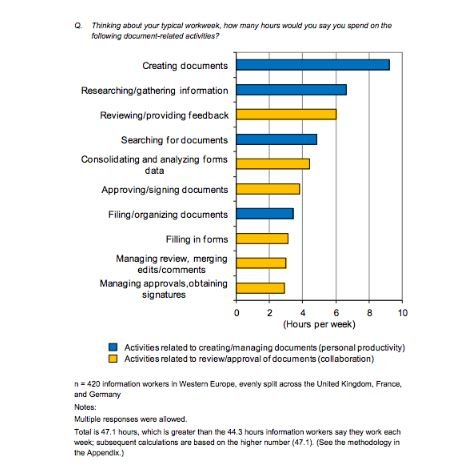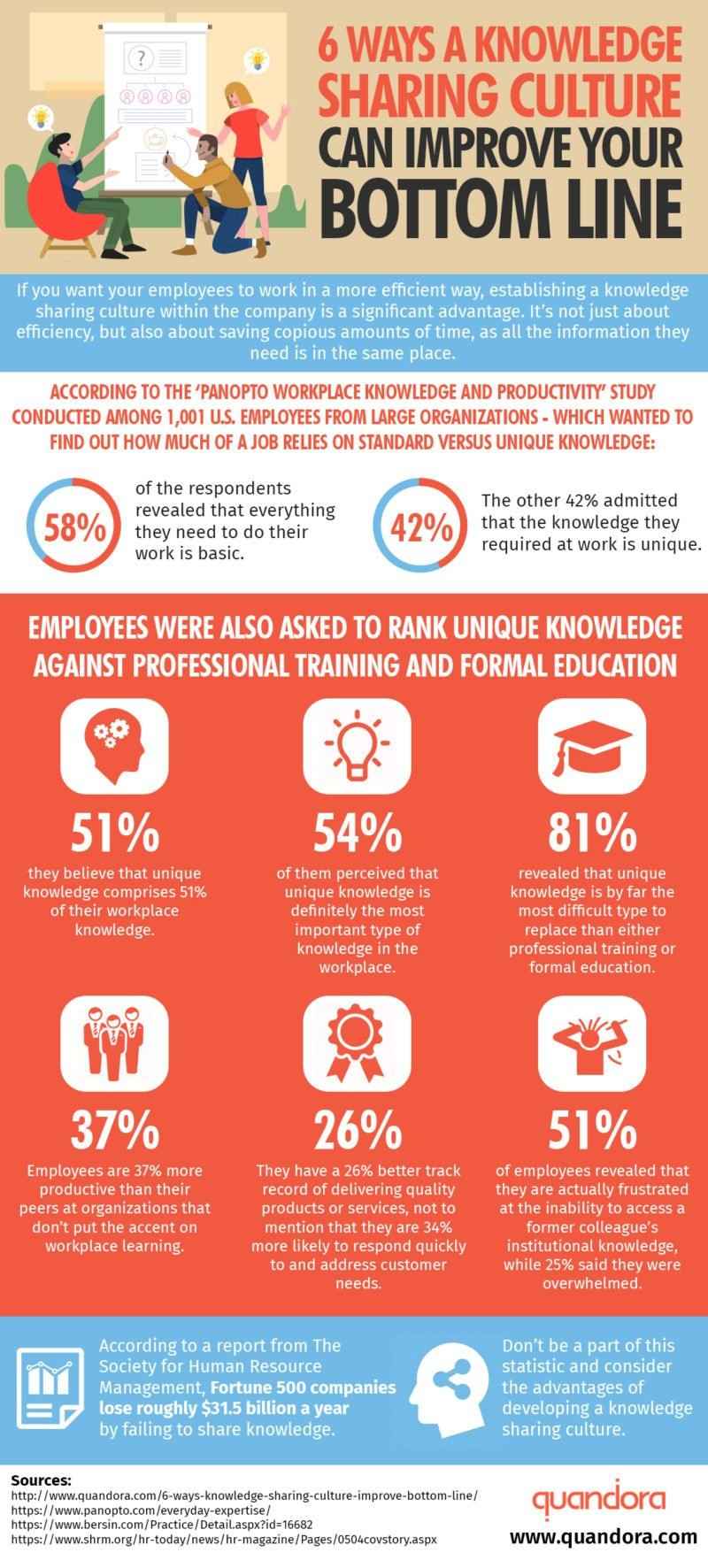Corporate professionals have to deal with a humongous amount of data on a daily basis. Especially for those at the managerial level, this task becomes even more tedious when the information is scattered across various files and folders.
According to a McKinsey report, employees spend 1.8 hours every day—9.3 hours per week, on an average—searching and gathering information. To put another way, businesses hire five employees, but only four shows up to work. The fifth one is off searching for answers, but not contributing any value! Furthermore, a report by IDC highlights that the knowledge worker spends about 2.5 hours per day, or roughly 30% of a workday, searching for information.
Look at the below figures from IDC’s Information Worker Survey to get a glimpse of the time employees spend in searching data:

Source: IDC’s Information Worker Survey
These figures bring to spotlight the valuable time your employees lose while searching for information, because of which productivity goes for a toss and they aren’t able to churn out quality deliverables on time.
Knowledge management is, therefore, becoming indispensable to ensure the smooth functioning of a business organization. Find out how managing knowledge meticulously can create a positive growth graph for your business.
1. Drives Better Decision-Making
A full-fledged knowledge management system in place ensures that your employees don’t have to wander from pillar to post to find information. This reduces their dependence on outside sources and gives them the flexibility to access information quickly, regardless of where they are. A central encyclopedia of knowledge is an asset for your workforce. It empowers them to fetch information instantly, while they are in a meeting, out for a field project, preparing a proposal, etc., thus helping them make well-informed decisions. Further, when your workforce shares their research and opinions with others, co-workers get different viewpoints to take into account, before making decisions.
2. Promotes Collaboration at Workplace
Managing knowledge effectively can help bolster collaboration among your workforce. If yours is a geographically spread out business, collaboration can become a task for your employees who are based in different locations. Managing knowledge on a single platform helps them connect with one another, and share updates related to their respective domains. This inculcates a more connected and cohesive work environment, where knowledge can be shared by your employees, for your employees.
3. Supports Learning & Development
A fool-proof knowledge management system in place provides your workforce with easy access to knowledge. They don’t have to toil for getting information on your products & services, mission & vision, clients and acquisitions, etc. Learning about your firm becomes easier for your employees, and they can make smart decisions that benefit them and your business as a whole.
4. Expedites Employee Onboarding
Inducting new recruits to your organization is another challenge. A proper knowledge management system can help you conquer this challenge with ease. Providing your trainees with a central repository of your business information helps them get acquainted with your work mechanism and processes faster. It expedites the process of employee onboarding by giving them the power to self-learn, understand the different aspects of your organization and start contributing to your business goals.
5. Decreases Interruptions
When information is ready-made and easy to fetch, the point of shooting emails to co-workers or raising support tickets doesn’t arise. This saves your support staff from answering repeated questions and lets them concentrate on more important issues.
6. Infuses Standardization Across Processes
Information spread haphazardly across numerous files and folders cause confusion. Proper documentation of your business processes ensures that all your employees are aware of your rules and codes of conduct and they are on the same page. When your workforce is in sync with your organization, they will be able to deliver quality work in less time.
Take a Step Towards Creating a Knowledge-Sharing Culture
Your focus shouldn’t be restricted to building a smart knowledge management system. Instead, you should look at knowledge management with a broader perspective and bring about a cultural change in your organization.
Creating a knowledge-sharing culture wherein your employees share their experiences on a particular project or the data that helped them clinch a deal, is what’s going to help you in the long run. Furthermore, building a knowledge management system that fits into the work mechanism of your employees will streamline the process of knowledge sharing and boost your efforts of transforming the culture of your organization.
 Source: Quandora
Source: Quandora
This infographic gives a clear picture of how creating a knowledge-sharing culture can help your employees become more efficient and enhance their productivity.
Bottomline
Your endeavor to build a knowledge management system for your employees can come to fruition only when you use the right knowledge base software. Looking at the numerous options available online today, it’s easy to get swayed.
Here are a few things that you should look out for before making the final call:
- An online text editor that lets you write, edit, and upload content easily.
- Anytime, anywhere accessibility – so that your employees can access information anytime and from anywhere.
- Conditional access – that help you set certain rules and conditions regarding the visibility of your content.
- Fonts, themes, and designs – to help you create a knowledge base that appeals to your audience.
- Intuitive reports – so that you know how your knowledge base is performing, which articles are the most popular, and which are the ones that need improvement.
It’s time to ditch your old conventional ways and switch to new modes of managing your business information.
FREE. All Features. FOREVER!
Try our Forever FREE account with all premium features!







